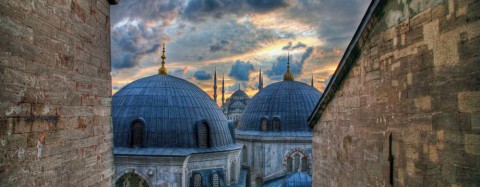In May we posted about Mike Duncan’s The History of Rome podcast, which, upon reaching episode 179, had concluded the tale of the Roman Empire’s heyday. Over its five-year run, Duncan’s show amassed a large, enthusiastic audience, most of whom have no doubt continued their exploration of Roman history elsewhere. It has even inspired some to launch history podcasts of their own, one of which presents itself as The History of Rome’s direct successor in subject, style, and tone. The History of Byzantium (RSS — iTunes), which debuted in May, aims to recount the story of Roman Empire of Late Antiquity and the Middle Ages, now better known as the Byzantine Empire, from the years 476 through 1453. Though perhaps less often discussed by the average history buff, the Byzantine Empire nonetheless offers a wealth of historical interest, especially, it seems, to podcasters; you may already have heard Lars Brownworth’s show 12 Byzantine Rulers, which eventually landed him a book deal. And many more Byzantine stories remain to tell.
Pierson, by day a televison critic, explicitly describes his project as both an unofficial sequel and an homage to The History of Rome. “I liked the simplification and explanation of the Roman story,” he writes in his introductory post. “I liked the half an hour length. I liked Mike’s sense of humour and timing. I liked his neutral tone which never felt like it was providing an overbearing opinion on the narrative. When Mike announced he would be stopping with the fall of the West in 476 I considered whether I could possibly take on the task of continuing the story. [ … ] Initially at least I hope to emulate Mike’s style. I want to keep the rough structure and neutral tone established on The History of Rome because I think so highly of it. I hope you won’t see it as simply an imitation and doubtless over time my own style will emerge.” This seems as honest an account as any of the way creators work off of their inspirations, and History of Rome fans will no doubt listen with interest to The History of Byzantium for both the developments in the tale and in Pierson’s way of telling it.
You can subscribe to The History of Byzantium via RSS or iTunes.
And, all of you history buffs, remember that you can find free courses in the History section of our collection of Free Online Courses from Great Universities.
Related content:
The History of Rome in 179 Podcasts
The Digital Tipping Point: The Wild Ride from Podcast to Book Deal
The Decline and Fall of the Roman (and American?) Empire: A Free Audiobook
Colin Marshall hosts and produces Notebook on Cities and Culture. Follow him on Twitter at @colinmarshall.



I will check out History of Byzantium. I was a big fan of History of Rome. It led me to a free iTunes U course from Yale on the Early Middle Ages, which I’ve greatly enjoyed.
http://itunes.apple.com/us/itunes‑u/early-middle-ages/id515946405
It is nice to see somebody taking up where Mr. Duncan left off. The story of the Ramoioi needs to be told, especially how they transform from Roman to Ramoioi and how they dealt with the world around them.
One of the biggest disservices done to Byzantium has been to always treat it as one of the dying vestiges of the Roman Empire but that it served as a bulwark against what else was coming from the east especially as Islam was making its way out of the Arabian Peninsula to spread to other parts of the world.
It is nice that you “picked up the baton” on this one and hopefully the rest of the story of this side of the empire could be told.
Sooner or later, especially as the great schisms get underway in Christendom, somebody also has to pick up the other vestige of the Roman Empire that exists to this day–the Papacy, where for a time existed alongside the Byzantines arguing for converts as well as over doctrine and who had the ultimate authority to decide what was doctrine.
And then there is the legacy of what the Ramoioi left, especially with the Slavic peoples and that they built their modern culture from their contact with the Ramoioi, which in itself seemed foreign to us because of our ancestors’ contacts with the Romans and that it also led to one of the great cultural divides between eastern and western Europe to this day, where Latin and Greek cultures even clashed.
I will be listening, hopefully be entertained, and perhaps may even learn something new from time-to-time.
But just like Mr. Duncan, you have taken on quite an undertaking for yourself, Mr. Pierson.
I wish you the best of luck in covering the other thousand years of the History of the Roman Empire.